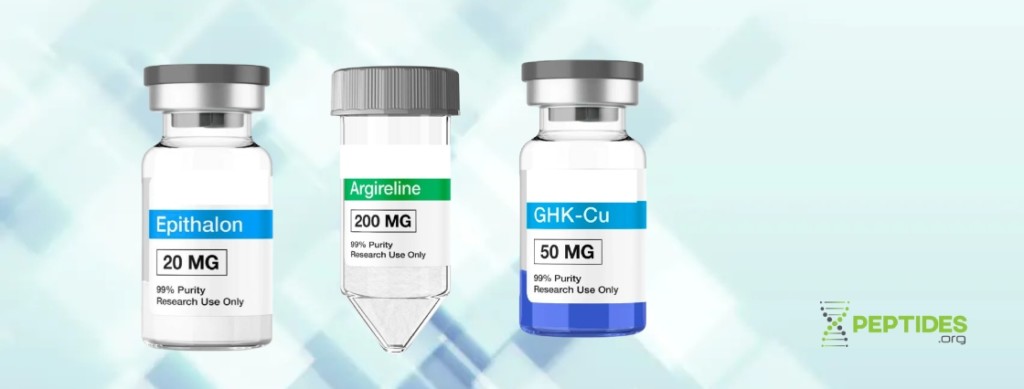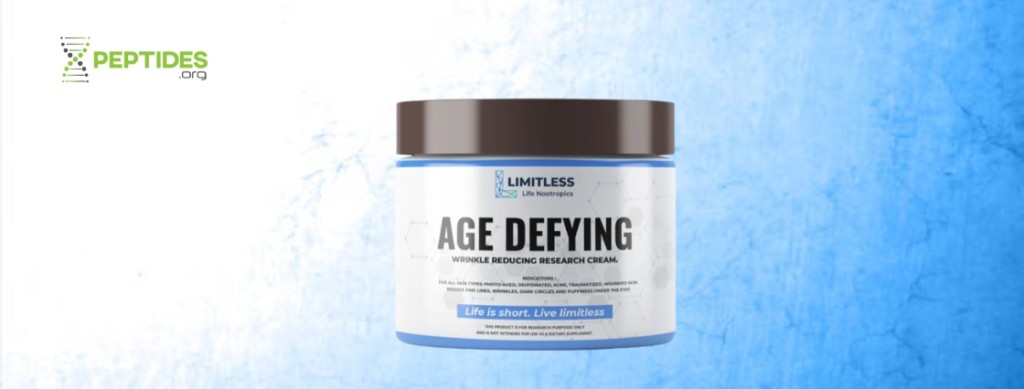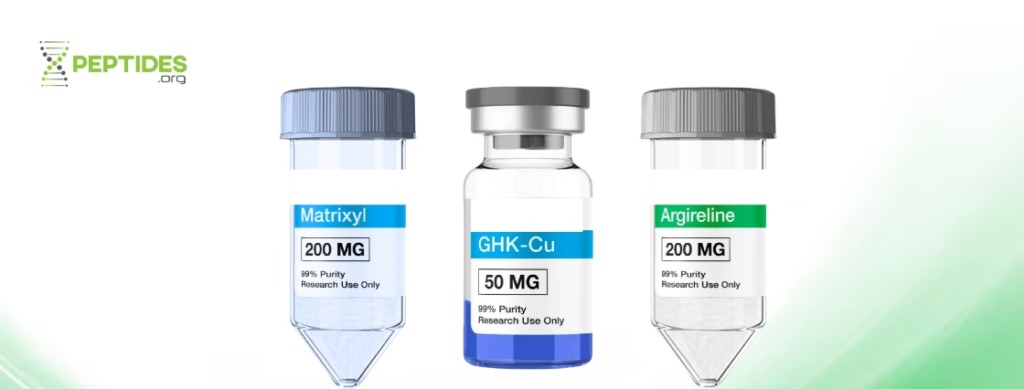Peptides for skin care are garnering significant interest in the dermatological community due to their promising effects.
Breakthrough compounds like GHK-Cu, Argireline, and Matrixyl have demonstrated potential skin-related benefits like:
- Enhancing collagen production
- Reducing the appearance of fine lines and wrinkles
- Improving skin elasticity and hydration
This article delves into the latest research and clinical findings on peptides for skin health, and includes a breakdown of their mechanisms of action, efficacy, and safety.
Dive in to explore how these compounds can revolutionize skincare and offer novel solutions for common skin concerns.
Buy research peptides from our top-rated vendor...

Disclaimer: Peptides.org contains information about products that are intended for laboratory and research use only, unless otherwise explicitly stated. This information, including any referenced scientific or clinical research, is made available for educational purposes only. Likewise, any published information relative to the dosing and administration of reference materials is made available strictly for reference and shall not be construed to encourage the self-administration or any human use of said reference materials. Peptides.org makes every effort to ensure that any information it shares complies with national and international standards for clinical trial information and is committed to the timely disclosure of the design and results of all interventional clinical studies for innovative treatments publicly available or that may be made available. However, research is not considered conclusive. Peptides.org makes no claims that any products referenced can cure, treat or prevent any conditions, including any conditions referenced on its website or in print materials.
Top 3 Peptides For Skin Care and Health
Before we delve deeper into how peptides work for skincare and wrinkles, we should outline the three most potent research compounds which scientists should consider incorporating into their experiments:
1. Best Research Peptide for Skin | GHK-Cu Peptide
GHK-Cu is a tripeptide with affinity to copper ions, occurring naturally in the body but declining with age. It can be applied either by injection or topically. GHK-Cu acts to:
- signal repair processes in connective tissue
- stimulate fibroblasts to produce more collagen
- increase the turnover of collagen and other components of the extracellular matrix in the skin
- facilitate the replacement of old matrix components with new ones
Clinical studies into GHK-Cu report significant anti-aging effects on the skin, such as 50% reduced wrinkle volume [1, 2, 3].
2. Best Topical Peptides for Skin | Age Defying Research Cream
The Anti-Wrinkle Research Formula Cream by Limitless Life is a blend of compounds with significant research potential, including:
- GHK-Cu
- Argireline
- SNAP-8
- Pentapeptide-18
- SYN-AKE
- Syn-Coll
These peptides work synergistically for wrinkle reduction in various ways, including by increasing collagen and elastin production, reducing facial muscle contractions, reducing the damaging effects of UV and active radicals, and preventing collagen breakdown [3, 4].
3. Best Oral Peptide Powder for Skin | Collagen Peptides Advanced
Collagen peptides are composed of partially denatured collagen from food sources of type I collagen such as bovine cartilage. They contain the amino acids glycine, proline, and hydroxyproline, which upon ingestion can be used by the body to produce new collagen type I—a major constituent of the skin.
Numerous studies report improved skin hydration and elasticity following supplementation with up to 10g/daily of collagen peptides [5, 6, 7].

Understanding Peptides in Skincare
Peptides in skincare work in diverse ways to improve the skin’s health and appearance, including through interactions with:
- Skin cells: Compounds like the longevity-promoting peptide epithalon have been shown to inhibit the apoptosis (death) of skin cells while stimulating their proliferation. This can benefit key cells like collagen-producing fibroblasts, found in the skin’s middle layer. The peptide may likewise speed up healing processes in the skin while upregulating the production of extracellular components [8, 9, 10].
- Extracellular components of skin: These are extracellular substances such as collagen, elastin, and hyaluronic acid, which are the skin’s major structural components and provide it with strength, resilience, elasticity, hydration and texture. Peptides like GHK-Cu can stimulate the turnover of these extracellular components, leading to the replacement of old components with new ones [1, 2, 3].
- Underlying musculature: Mainstream anti-wrinkle procedures such as the injectable application of botulinum neurotoxins (Botox) work by preventing the contraction of the musculature under the skin. Peptides like Argireline, SNAP-8, pentapeptide-18, SYN-AKE each work in a similar way, even when applied transdermally [4].
What are Collagen Peptides?
Typically derived from bovine cartilage and other food sources rich in type I collagen, collagen peptides are small protein fragments resulting from the breakdown of larger collagen molecules.
Collagen peptides are essentially partial chains of amino acids, specifically glycine, proline, and hydroxyproline. When consumed, they furnish the body with essential building blocks to produce new collagen type I—a fundamental component of human skin [11, 12].
The appeal of collagen peptides stems from their potential benefits to skin health. Numerous scientific studies have highlighted their positive effects, particularly in enhancing skin hydration and elasticity.
Older adults commonly experience a decline in collagen production leading to wrinkles and reduced skin hydration. Studies in elderly patients suggest that collagen peptide supplementation may reverse some of these age-related skin changes [5, 6, 7].
The small molecular size of collagen peptides ensures easy absorption by the body, making them a popular choice for bolstering skin health and vitality.
What are Copper Peptides?
Copper peptides include compounds like GHK-Cu and AHK-Cu, which have high affinity to copper ions (2+). This affinity may play a crucial role in the ability of copper peptides to improve skin regeneration and provide other skincare benefits.
One study has even suggested that some of the effects of GHK-Cu on the skin can be reproduced by copper ions alone, but not by the tripeptide GHK by itself [13].
Research reveals that copper peptides work via:
- Stimulation of MMP Synthesis: Copper peptides increase matrix metalloproteinases such as MMP-1 and MMP-2 in the conditioned media of cultured fibroblasts. These are enzymes involved in the breakdown of the extracellular matrix in normal physiological processes, including tissue remodeling. Therefore, increased MMP-1 and MMP-2 may enhance remodeling of the extracellular matrix [3].
- Secretion of TIMPs: Copper peptides boost the secretion of TIMP-1 and TIMP-2, which are tissue inhibitors of metalloproteinases. TIMPs regulate the activity of MMPs. The simultaneous increase in both MMPs and TIMPs results in a balanced turnover where both breakdown and buildup of the extracellular matrix are being regulated [3].
- Remodeling of Extracellular Matrix: Research shows that GHK-Cu not only promotes the production of connective tissue, but also aids in the remodeling of the extracellular matrix. Remodeling of the extracellular matrix involves the renewal and restructuring of the matrix that supports cells [3, 13].
Peptides and Skincare | Injectables, Topicals, and Oral Powders
Peptides for skin care may be administered as injections, topically, or orally ingested, just to name a few routes.
The different routes of application may impact the skin in various ways. Here is a review of these popular formats:
- Injectable peptides for skincare: These include injectable peptides such as GHK-Cu and epithalon. The systemic application of these peptides is suggested to have rejuvenating effects on various tissues and systems, including the skin. GHK-Cu may also speed up the healing of skin wounds and injuries [1, 2, 3, 8, 9, 10].
- Topical peptides, creams, serums: Topical peptides and cream- or serum-based peptide blends can penetrate through the corneal layers of the skin. Examples include topical copper peptides, Argireline, SNAP-8, pentapeptide-18, SYN-AKE and Syn-Coll. These topical peptides work via a variety of ways to reduce visible signs of aging such as wrinkles [3, 4].
- Oral peptide powders: Peptide powders for skincare are hydrolyzed forms of collagen extracted from food sources. Oral supplementation has been suggested to improve skin elasticity and hydration [5, 6, 7, 11].
Is Peptide Therapy for Skin Care Beneficial?
Peptides can provide a range of benefits for skin health such as enhanced skin thickness, reduced wrinkle size and depth, and improvised skin hydration and elasticity.
Here are some of the main benefits linked to research peptides for skincare:
- Reduced wrinkle depth and size: Numerous studies report that peptides like GHK-Cu, Argireline, SNAP-8, pentapeptide-18, and SYN-AKE can reduce wrinkles by anywhere between 30-60% [2, 4, 14, 15].
- Protection against photoaging and UV damage: GHK-Cu has been suggested to protect the skin’s keratinocytes from UV light and active radicals [16].
- Faster skin healing: Studies report that collagen dressing with incorporated GHK-Cu can accelerate the healing of skin wounds in healthy and diabetic test animals [3].
- Improved skin hydration and elasticity: Studies on collagen peptide supplements, consumed in doses of up to 10g/daily, report that oral supplementation can significantly improve hydration and elasticity [5, 6, 7].
- Increased skin firmness: By stimulating collagen production, peptides such as Syn-Coll can increase skin’s thickness and firmness. The peptide works by stimulating transforming growth factor beta (TGF-β), a growth factor that induces collagen biosynthesis and inhibits matrix metalloproteinases degrading collagen [4].
As evident, peptides can improve many aspects of skin health and appearance, ranging from wrinkle reduction to improving skin firmness and wound healing.
Researchers should carefully select the most appropriate peptide or blend for their experiments based on their study objective.

Best Peptides For Skincare and Skin Health
We will now review some of the more notable peptides for skincare, including injectable, transdermal, and oral formulations.
Research Peptides for Skincare
Two of the most notable injectable peptides for skin and anti-aging include GHK-Cu and epithalon.
GHK-Cu
GHK-Cu (glycyl-l-histidyl-l-lysine-copper) is an endogenously produced peptide with high affinity to copper ions (2+) that was discovered in 1973 by Dr. Loren Pickart [1].
The peptide may act as an early signal for skin repair since its amino acid sequence is present in the α2(I) chain of type I collagen. It is released in the event of an injury when collagen is enzymatically broken down. Likewise, GHK-Cu may regulate MMP-1 and MMP-2, which break down old collagen and glycosaminoglycans [3].
Thus, GHK-Cu may act as a signal for the production of new extracellular matrix components such as collagen, elastin, and hyaluronic acid, while increasing intracellular matrix turnover and the replacement of old matrix components with new ones [1].
This may result in improved skin healing, the tightening of loose skin, reduced wrinkles, photoaging protection and more.
Buy GHK-Cu from our top-rated vendor...

Epithalon
Epithalon (AEDG peptide) is a bioregulator peptide that boosts telomerase activity, leading to the elongation chromosomal telomeres, a phenomenon that has been hypothesized to play a role in decelerating aging [17, 18]. Russian studies have reported that the peptide may slow down aging of various body systems such as the cardiovascular system [19].
The peptide may also enhance the function, activity, and growth of skin fibroblasts, and offers protection against apoptosis [8, 9].
For example, epithalon may reduce the expression of the apoptosis-inducing caspase-3 and consequently MMP-9 (matrix metalloproteinase-9) in aged skin fibroblast cultures. This may result in increased collagen production and improved skin parameters such as skin thickness, firmness, and appearance [10].
In addition, epithalon is also researched for its effects on sleep, chronic inflammation, DNA repair, and inhibition of tumor development [20, 21, 22, 23].
Buy Epithalon from our top-rated vendor...

Peptide Creams and Serums for Skincare
Next, we’ll outline peptide creams, gels, and serums that can help with skin’s health and appearance.
Age Defying Copper Peptide Cream
This innovative topical peptide formula is crafted by esteemed peptide company Limitless Life and combines numerous scientifically-researched peptides. Renowned for their top-tier, third-party verified compounds, Limitless Life stands as a leading research peptide supplier.
The blend incorporates several compounds with skin revitalizing properties, including GHK-Cu and other peptides such as acetyl hexapeptide-3 (Argireline), SNAP-8 (acetyl octapeptide-3), Pentapeptide-18 (leuphasyl), SYN-AKE, and Syn-Coll (palmitoyl tripeptide-5).
Each of these peptides have slightly different mechanisms for improving skin quality. For example, Syn-Coll stimulates the skin's production of collagen by stimulating TGF-β [24]. Syn-Coll may also inhibit MMPs that degrade collagen to ultimately improve collagen levels, leading to enhanced skin firmness and elasticity [4, 25].
Argireline, SNAP-8, pentapeptide-18, and SYN-AKE work by blocking the release of the neurotransmitter acetylcholine from neurons which activates muscle contraction [4, 26].
Applying this blend topically may block facial muscle contractions, a process similar to the effects of “Botox” [27].
Buy Copper Peptide Cream from our #1 recommended vendor...

Argireline
Argireline, known as acetyl hexapeptide-3, mimics the N-terminal end of a protein called SNAP-25 (synaptosome-associated protein 25kDa).
SNAP-25 is a component of the SNARE complex, which is a protein complex involved in the process of neurotransmitter (acetylcholine) release in neurons. By destabilizing SNARE, Argireline prevents the subsequent release of neurotransmitters at synapses, blocking the release of neurotransmitters responsible for facial muscle contractions. As a result, the muscles relax and wrinkles become less visible [7, 26].
Buy Argireline from our top-rated vendor...

Matrixyl
Matrixyl is a pentapeptide known as palmitoyl pentapeptide-4. It is a fragment of the C-terminal propeptide of type I collagen. Thus, it acts as a signaling molecule for collagen damage and stimulates the production of new collagen and other extracellular matrix proteins. Its palmitoyl moiety results in more effective delivery across the skin [4].
Pro-Collagen Multi-Peptide Booster Serum
This highly-rated serum is another comprehensive blend of topical research peptides and includes tripeptide-1 (GHK), palmitoyl tripeptide-1, palmitoyl tetrapeptide-7, palmitoyl hexapeptide-12 (Biopeptide EL), myristoyl hexapeptide-16, myristoyl pentapeptide-17, hexanoyl dipeptide-3 norleucine acetate, and azelaoyl bis-dipeptide-10. These ingredients have been found to improve skin quality and appearance by upregulating collagen production and other extracellular matrix components [4].
Peptide Powders for Skincare
Peptide-based powders derived from dietary sources can also be effectively used as supplements for skin health. Here are two notable products:
Collagen Peptides Advanced
This top-rated collagen peptide supplement by Vital Proteins can help to improve skin elasticity and hydration, which may have favorable effects on appearance and wrinkles. Based on the available evidence, it is essential to select a supplement that delivers at least 10g of collagen peptides per serving and this product does just that [5, 6, 11, 7].
Momentous Collagen Peptides Powder
This collagen peptide powder by Momentous is among the few supplements that provides an optimal amount per serving, while delivering additional nutrients such as vitamin C— the main antioxidant in the skin that also stimulates skin collagen synthesis. Buyers should note that while collage peptide powders are generally not available in research-grade quality, many producers adhere to strict manufacturing and quality control guidelines [28].
Peptides Side Effects and Safety
Based on the available clinical data, topical peptides like GHK-Cu, Argireline, and palmitoyl tripeptide-5 appear to be safe and well-tolerated when applied onto the skin [4, 2, 14, 25, 29].
Collagen peptides used in dietary supplements are also not associated with any notable side effects [30].
Injectable peptides like GHK-Cu and epithalon also appear to be generally well-tolerated [3, 23]. Yet, the subcutaneous administration of these peptides can lead to local reactions at the injection site, such as:
- Pain
- Bleeding
- Induration
- Swelling
Notwithstanding their relative safety, researchers should note that the majority of anti-aging and skincare peptides have not undergone thorough study, including long-term safety studies in a variety of populations.

Can Peptides Help With Wrinkles?
Peptides can significantly improve collagen synthesis, extracellular matrix turnover, and skin elasticity, firmness, and overall appearance. As a result of these mechanisms, research peptides may also diminish the appearance of facial wrinkles.
Here are more detailed data on some of the more common anti-wrinkle peptides:
- GHK-Cu studies have reported 55.8% reduced wrinkle volume and 32.8% reduced wrinkle depth after eight weeks of daily topical application [2].
- 10% Argireline cream was reported to lead to 50% wrinkle depth reduction when applied twice daily for one month, compared to a 10% improvement for the control group [15].
- SNAP-8, aka acetyl octapeptide-3 (or acetyl octapeptide-1), works by blocking facial muscle contractions and can reduce wrinkle depth by up to 35% [4].
- SYN-AKE, aka tripeptide-3, is another peptide that prevents facial muscle contractions, and was shown in a 28-day study to decrease wrinkle visibility by as much as 52% [4].
Additional studies report the significant anti-wrinkle potential of other peptides, including palmitoyl hexapeptide-12 (Biopeptide EL), and pentapeptide-18 (Leuphasyl) [4].
Can Peptides Help With Sagging Skin?
Several peptides have been suggested to improve skin elasticity, which may potentially help with sagging skin.
For example, copper peptides like GHK-Cu have been shown to improve elasticity thanks to the effects of copper ions on the enzyme lysyl oxidase. By activating this enzyme, copper peptides appear to upregulate the production of elastin and its crosslinking with collagen, leading to improved skin firmness and elasticity [31].
Further research suggests that peptides like Syn-Coll, which prevent the degradation of collagen and elastin, also result in improved skin elasticity and firmness [4].
Specific research targeting sagging skin is still lacking, and more evidence is required regarding the potential effectiveness of different peptides.
Peptides and Skincare | Overall
The most actively researched peptides for skin health and rejuvenation come in a variety of formats, including injectable peptides, creams and serums, and collagen peptide powders for oral ingestion.
Peptides demonstrate potential skin-related benefits including boosted collagen production, enhanced skin elasticity, and reduced appearance of wrinkles. With the number of skincare peptides available for study, researchers may consider a multi-faceted approach for optimizing research outcomes.
While many of these peptides have gained popularity in cosmetic formulations, clinical evidence is still being gathered as to their efficacy and safety. At this time, peptides like GHK-Cu and epithalon are available only to qualified researchers for scientific or educational aims.
Be sure to check out our #1 recommended supplier of research peptides for skincare!
